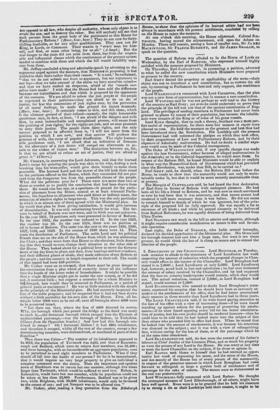The question of Reform was alluded to in the House
of Lords on Wednesday, by the Earl of RADNOR, who expressed himself highly satisfied with the measure proposed by Ministers. On Thursday, Earl CARNARVON, in presenting a petition, adverted to what he called the new constitution which Ministers were prepared to present to the country. Earl GREY denied the propriety or applicability of the term—their object was not to introduce a new constitution, but to restore the old one, byrestoring to Parliament its best and only support, the confidence of the people. Lord WitAuNcLurE concurred with Lord Carnarvon, that the plan was not a new form of representation, but in essence a new constitution. Lord WYNFORD said he was not perhaps so well read in the history of the country as Earl Grey ; yet even he could undertake to prove that the principle of the bill was not that of the ancient constitution of Eng- land. The privilege of sending members to Parliament had never been granted to places by reason of their population, but because the inhabit- ants were tenants of the King or of some of his great vassals. Lord KING thought, that on such a theory, Scotland was a most per. fect model of representation, for there none but tenants in capite were allowed to vote. He held the measure as the greatest and best that had been introduced since the Revolution. His Lordship said the present Government had well redeemed the pledges on which they took office, by their propositions of Law and Parliamentary Reform, and by their exposure of Admiralty malversation. He had no doubt a similar expo- sure would soon be made of the Colonial management. The Duke of WELLINGTON said, if any specific charge was made against the late Government, either because of alleged malversations the Admiralty or in the Colonial department, he would meet them. In respect of the Reform Bill, he hoped Ministers would be able to explain in what way the Monarchical form of Government which had prevailed since the Revolution, was, under that Bill, to be carried on ?
Earl GREY said, he should, when the Reform Bill came before the House, be ready to show that the monarchy would not only be main- tainable under it, but that it would be more securely maintainable than at present.
The Marquis of CLEVELAND said, he had heard the first declaration of Earl Grey in favour of Reform with unfeigned pleasure. He had been all his life a friend to Reform, and he was now as much convinced as ever he had been that it was necessary, and that recent events had rendered it still more necessary than it was before. He did not mean to commit himself to details of which he was ignorant, but of the prin- ciple of the proposed bill he fully approved. He was equally a foe to extremes of all kinds ; and while he prayed sincerely to be delivered from Radical Reformers, lie was equally desirous of being delivered from Ultra-Tories.
Earl STANHOPE saw much in the bill to admire and approve although it might require considerable modification to insure it due and favour- able operation.
Last night, the Duke of NORFOLK, who holds several boroughs, declared his decided approbation of the Ministerial plan. His Grace said his borough interest had cost him a large sum, but were it ten times greater, he would think the loss of it cheap to secure and to extend the liberties of the people.


























 Previous page
Previous page